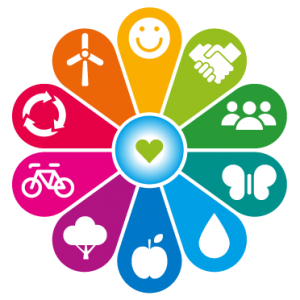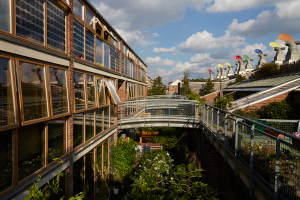 The organization Bioregional works with communities (as well as businesses, governments, and other entities) to create better places where people can “live happy, healthy lives within the natural limits of the planet.”
The organization Bioregional works with communities (as well as businesses, governments, and other entities) to create better places where people can “live happy, healthy lives within the natural limits of the planet.”
They base their work around the following 10 principles of the One Planet Living framework:
Health and Happiness
Encouraging active, sociable, meaningful lives to promote good health and well-being
Equity and Local Economy
Creating bioregional economies that support equity and diverse local employment and international fair trade
Culture and Community
Respecting and reviving local identity, wisdom and culture; encouraging the involvement of people in shaping their community and creating a new culture of sustainability
Land Use and Wildlife
Protecting and restoring biodiversity and creating natural habitats through good land use
Sustainable Water
Using water efficiently in buildings, farming, and manufacturing. Designing to avoid local issues such as flooding, drought, and water course pollution
Local and Sustainable Food
Supporting sustainable and humane farming; promoting access to healthy, low-impact, local, seasonal, and organic diets; and reducing food waste
Sustainable Materials
Using safe and sustainable products, including those with low embodied energy, sourced locally, made from renewable or waste resources
Sustainable Transport
Reducing the need to travel, and encouraging low- and zero-carbon modes of transport to reduce emissions
Zero Waste
Reducing waste, reusing where possible, and ultimately sending zero waste to landfill
Zero Carbon
Making buildings energy efficient and delivering all energy with renewable technologies
The following are the most established One Planet Communities that Bioregional has been working with around the world:
- BedZED, Hackbridge, Sutton (south London), UK

- One Brighton, Brighton & Hove, East Sussex, UK
- WestWyck EcoVillage, Melbourne, Australia
- Singita Serengeti resort, Tanzania
And these One Planet Communities are currently being developed:
- Grow Community, Bainbridge Island, WA, USA
- Zibi, Ottawa, Canada
- NW Bicester eco-town, Oxfordshire, UK
- Sonoma Mountain Village, Rohnert Park, CA, USA
- Hollerich Village, Luxembourg City, Luxembourg
One Planet Communities is a voluntary program, and it is not a certification program. Similar frameworks that do offer certification include the: Living Community Challenge, and LEED for Neighborhood Development, and STAR Communities. (Check back soon for a new post about those rating and certification programs.)
Related post:


{ 0 comments… add one now }